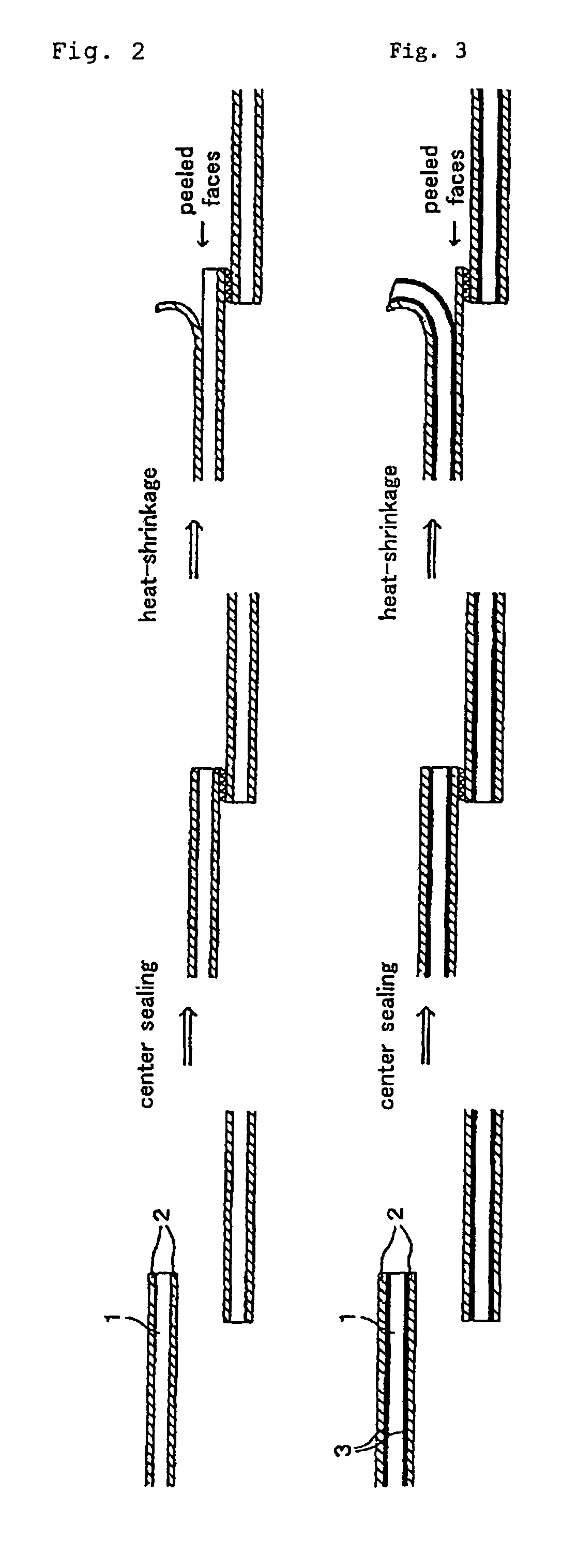Shrink labels
a label and label technology, applied in the field of shrink labels, can solve the problems of shrink labels being skewed, shrink labels being distorted or broken, etc., and achieve the effects of preventing the content of the container from deteriorating, and reducing the risk of damag
- Summary
- Abstract
- Description
- Claims
- Application Information
AI Technical Summary
Benefits of technology
Problems solved by technology
Method used
Image
Examples
example 1
[0104]As an outer surface layer, a polyester type resin, which uses terephthalic acid as a dicarboxylic acid component and contains 67% by mole of a component derived from ethylene glycol and 33% by mole of a component derived from 1,4-cyclohexanedimethanol as a diol component, was used. In addition, a melting point of this polyester type resin could not be measured.
[0105]As an intermediate layer, a styrene-butadiene-styrene copolymer (styrene: 78% by weight, butadiene: 22% by weight, Vicat softening point: 72° C., MFR: 5.6 g / 10 minutes) was used.
[0106]As an adhesive layer, a maleic anhydride modified styrene-ethylene / butylene-styrene block copolymer (styrene content: 30% by weight, maleic anhydride addition rate: 1.0% by weight, MFR: 4.0 g / 10 minutes, specific gravity: 0.92) was used.
[0107]These resins were extruded into a heat-shrinkable multilayer resin film having a five-layer structure of outer surface layer (6 μm) / adhesive layer (1 μm) / intermediate layer (31 μm) / adhesive layer...
example 2
[0108]As an outer surface layer, a polyester type resin, which uses terephthalic acid as a dicarboxylic acid component and contains 70% by mole of a component derived from ethylene glycol, 10% by mole of a component derived from diethylene glycol and 20% by mole of a component derived from 1,4-cyclohexanedimethanol as a diol component, was used. In addition, a melting point of this polyester type resin could not be measured.
[0109]As an intermediate layer, a styrene-butadiene-styrene copolymer (styrene: 78% by weight, butadiene: 22% by weight, Vicat softening point: 72° C., MFR: 5.6 g / 10 minutes) was used.
[0110]As an adhesive layer, a maleic anhydride modified styrene-ethylene / butylene-styrene block copolymer (styrene content: 30% by weight, maleic anhydride addition rate: 1.0% by weight, MFR: 4.0 g / 10 minutes, specific gravity: 0.92) was used.
[0111]These resins were extruded into a heat-shrinkable multilayer resin film having a five-layer structure of outer surface layer (6 μm) / adhe...
example 3
[0112]As an outer surface layer, a polyester type resin, which uses terephthalic acid as a dicarboxylic acid component and contains 67% by mole of a component derived from ethylene glycol and 33% by mole of a component derived from 1,4-cyclohexanedimethanol as a diol component, was used.
[0113]As an intermediate layer, a styrene-butadiene-styrene copolymer (styrene: 78% by weight, butadiene: 22% by weight, Vicat softening point: 72° C., MFR: 5.6 g / 10 minutes) was used.
[0114]As an adhesive layer, a maleic anhydride modified styrene-ethylene / butylene-styrene block copolymer (styrene content: 30% by weight, maleic anhydride addition rate: 0.5% by weight, MFR: 4.0 g / 10 minutes, specific gravity: 0.91) was used.
[0115]These resins were extruded into a heat-shrinkable multilayer resin film having a five-layer structure of outer surface layer (6 μm) / adhesive layer (1 μm) / intermediate layer (31 μm) / adhesive layer (1 μm) / outer surface layer (6 μm) by a co-extrusion process to form a shrink lab...
PUM
| Property | Measurement | Unit |
|---|---|---|
| wavelength | aaaaa | aaaaa |
| wavelength | aaaaa | aaaaa |
| wavelength | aaaaa | aaaaa |
Abstract
Description
Claims
Application Information
 Login to View More
Login to View More - R&D
- Intellectual Property
- Life Sciences
- Materials
- Tech Scout
- Unparalleled Data Quality
- Higher Quality Content
- 60% Fewer Hallucinations
Browse by: Latest US Patents, China's latest patents, Technical Efficacy Thesaurus, Application Domain, Technology Topic, Popular Technical Reports.
© 2025 PatSnap. All rights reserved.Legal|Privacy policy|Modern Slavery Act Transparency Statement|Sitemap|About US| Contact US: help@patsnap.com



